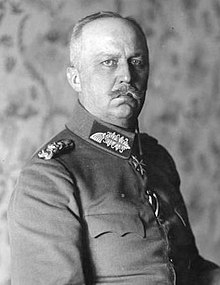 Global Information
Global InformationErich Ludendorff information
General of the Infantry Erich Ludendorff | |
|---|---|
 Ludendorff in 1915 | |
| Member of the Reichstag | |
| In office 24 June 1920 – 13 June 1928 | |
| Constituency | National list |
| First Quartermaster General of the Great General Staff | |
| In office 29 August 1916 – 26 October 1918 | |
| Senior | Paul von Hindenburg[a] |
| Preceded by | H. von Freytag-Loringhoven |
| Succeeded by | Wilhelm Groener |
| Personal details | |
| Born | Erich Friedrich Wilhelm Ludendorff 9 April 1865 Kruszewnia, Province of Posen, Kingdom of Prussia, (now Kruszewnia, Poland) |
| Died | 20 December 1937 (aged 72) Munich, Nazi Germany |
| Political party | NSDAP |
| Other political affiliations | DVFP NSFB |
| Spouses | Margarethe Schmidt
(m. 1909; div. 1925)Mathilde von Kemnitz
(m. 1925) |
| Relatives | Hans Ludendorff (brother) Heinz Pernet (stepson) |
| Signature |  |
| Military service | |
| Allegiance |
|
| Branch/service |
|
| Years of service | 1883–1918 |
| Rank | General der Infanterie |
| Battles/wars |
|
| Awards | Pour le Mérite Iron Cross 1st Class |
Erich Friedrich Wilhelm Ludendorff (German pronunciation: [ˈeːrɪç ˈfʁiːdʁɪç ˈvɪlhɛlm ˈluːdn̩ˌdɔʁf]; 9 April 1865 – 20 December 1937) was a German general, politician and military theorist. He achieved fame during World War I for his central role in the German victories at Liège and Tannenberg in 1914.
Following his appointment as First Quartermaster General of the Imperial German Army's Great General Staff in 1916, he became the chief policymaker in a de facto military dictatorship that dominated Germany for the rest of the war. After Germany's defeat, he contributed significantly to the Nazis' rise to power.
Erich Ludendorff came from a family of the minor nobility in Kruszewnia, located in the Prussian Province of Posen. After completing his education as a cadet, he received his commission as a junior officer in 1885. In 1893, Ludendorff was admitted to the prestigious German War Academy and was recommended by its commandant to the General Staff Corps only a year later. By 1904, he had rapidly risen in rank to become a member of the Army's Great General Staff, where he oversaw the development of the Schlieffen Plan.
Despite being temporarily removed from the Great General Staff for meddling in politics, Ludendorff restored his standing in the army through his success as a commander in World War I. In August 1914, he led the successful German assault on Liège, a feat for which he earned the Pour le Mérite. Upon being transferred to the Eastern Front under the command of General Paul von Hindenburg, Ludendorff was instrumental in inflicting a series of crushing defeats against the Russians, including at Tannenberg and the Masurian Lakes.
By August 1916, he had successfully lobbied for Hindenburg's appointment as Supreme Commander as well as his own promotion to First Quartermaster General. Once he and Hindenburg had established what some authors[who?] describe as a de facto military dictatorship, Ludendorff directed Germany's entire military strategy and war effort until the end of the conflict. In this capacity, he secured Russia's defeat in the east and launched a new wave of offensives on the Western Front resulting in advances not seen since the war's outbreak. However, by late 1918, all improvements in Germany's fortunes were reversed after its forces' decisive defeat in the Second Battle of the Marne and the Allies' Hundred Days Offensive. Faced with the war effort's collapse and a growing popular revolution, Kaiser Wilhelm II forced Ludendorff to resign.
After the war, Ludendorff became a prominent nationalist leader and a promoter of the stab-in-the-back myth, which posited that Germany's defeat and the settlement reached at Versailles were the result of a treasonous conspiracy by Marxists, Freemasons and Jews. He also took part in the failed 1920 Kapp Putsch and 1923 Beer Hall Putsch before unsuccessfully standing for election for President against Hindenburg, his wartime superior. Thereafter, he retired from politics and devoted his final years to the study of military theory. His most famous work in this field was The Total War, where he argued that a nation's entire physical and moral resources should remain forever poised for mobilization because peace was merely an interval in a never-ending chain of wars. Following his death due to liver cancer in Munich in 1937, Ludendorff was given—against his explicit wishes—a state funeral organized and attended by Adolf Hitler.
Cite error: There are <ref group=lower-alpha> tags or {{efn}} templates on this page, but the references will not show without a {{reflist|group=lower-alpha}} template or {{notelist}} template (see the help page).